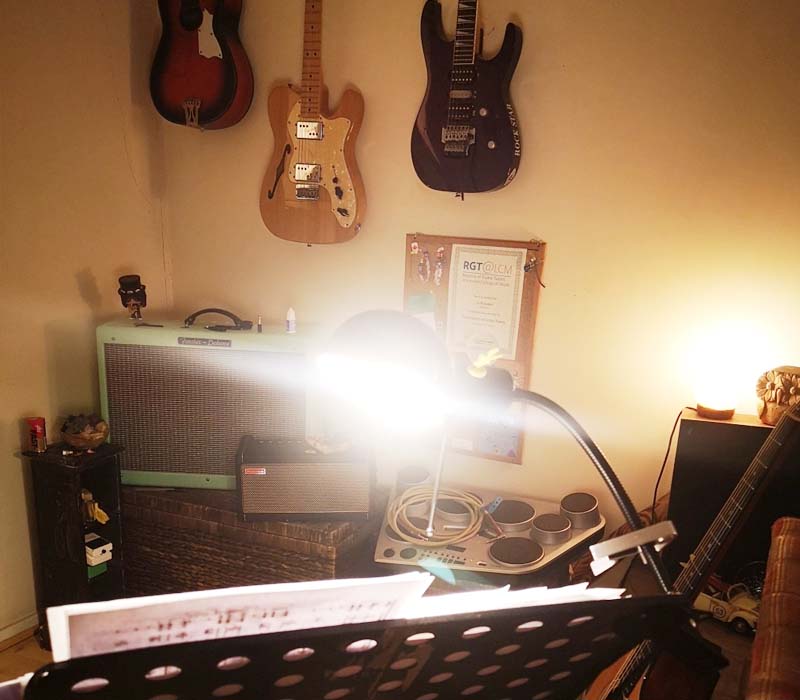Should I get a guitar teacher?
A common question. I also wonder this when I’m learning a new skill. There are so many resources online that surely we can muddle through on our own and figure it out. Right?
True. There are loads of resources online. The issue is though there’s the whole spectrum of quality available, from excellent all the way to absolute rubbish. When we’re learning something new we can’t tell which is which sometimes.
What’s also true is, if you’re someone who is self disciplined you do have a good chance of teaching yourself. Inevitably, though, learning hits a plateau. There can be little things that cause confusion that may not have to be such a mystery if you could have an explanation from someone in a way that you understand.
Another factor as a newby is that if you don’t have the language, you don’t know what to search or ask for.
Maybe you want ongoing lessons. Maybe a one-off check-in or a more sporadic check-in. The same applies in each case. I’ve taught people guitar that fit in all of these categories. Having lessons from a good teacher will give insight and shortcuts in a way we can’t do for ourselves.
So what’s the value of a teacher?
5 Reasons to have a guitar teacher:
1. Feedback
This is a comment and conversation I’ve heard many times from new students who have begun their guitar journey from generic online videos. Feedback.
The Internet is a fantastic resource. There are excellent teachers, top quality videos instructing a range of songs, styles and abilities. Some people find this easier than others. People have different learning styles and video does not work for everyone.
More specifically,
They don’t offer feedback. Often people want feedback. Personalised feedback.
Am I holding the neck right? Am I sitting right? Why is the string buzzing? Where do I put my thumb? (I can’t do it like the man on the video). Why don’t my chords sound like the video? Are my fingers too big/small? Is my guitar too big? My strumming pattern does sound the same as the video, why? Why does my guitar feel so big?
An experienced professional will (should) see and hear what you’re doing and can hopefully shed insight and give direction on how to make it right. Or at least help you understand.
2. Setting goals and a sense of direction.
This is important because its personal to each individual. Having a professional formulate some goals that will make sense to you is priceless. Learning songs you love will get you through those times when your fingers hurt or you wonder why you’re bothering at all. It’s easier if you know what your next little milestone is.
A good teacher will listen and if they listen well will be able to help you figure out a direction and some goals with you.
People learn guitar for such a range of reasons: grades/school, for fun, to sing along, a hobby in retirement, a divorce, to play as a surprise for a partner, to write songs, they love music. I have a student who inherited her dad’s guitar when he passed away and she wanted to honour him. The list goes on.
It’s important to identify and set achievable and relevant goals.
3. Time to ask questions specific to you.
There is nothing quite like sitting in a room with someone to spark off a conversation you weren’t expecting. Often you’ll get a lot more than you bargained for in a way you couldn’t have pre-empted.
Some of the most useful insights and help for students in my lessons has come from conversations that went off on a tangent. We’ve discovered goals they didn’t realise they had.
Having time in a one to one setting with a professional gives us chance to ask questions. Specific questions to us.
What is the 7 in C7? Why is the guitar tuned EADGBe? Do I need to learn scales? How long does it take to learn guitar? Is my guitar too big? (a few questions I’ve heard in lessons…). Write your questions down. Ask your teacher.
4. Accompaniment and jamming
Jamming and playing along to/with someone else can be priceless. It teaches you how to listen and respond, helps develop your timing and rhythm, helps with ear training. We need to hear things in real time to fully understand it when learning an instrument. Music moves. You have to keep up, join in, adapt your volume. Playing along also helps develop improvisation and melody.
It can take more time for some people to get used to the distraction of someone else playing while they’re trying to concentrate. To feel this get easier over time really boosts confidence. It’s also really good fun.
We also have mirror neurons that help us emulate what someone in front of us is doing. It can be the best way to learn for some people.
5. Being heard and being seen
Often being in the company of someone experienced in a pursuit that we’re interested in is inspiring and exciting. It makes you feel like you’re on the journey, involved. It makes it real, not just a distant dream. Having a chance to begin, jam, ask questions, get feedback and set goals with an experienced professional catalyses the learning. It identifies us with the pursuit. Put yourself in the right environment. You can now say ‘I play guitar’.
There are a list of approaches to practising and learning anything that can enhance your progress. Having a (good) teacher (that you click with) is one of them. Stay engaged and interested and remember to have fun.
Jo


0 Comments